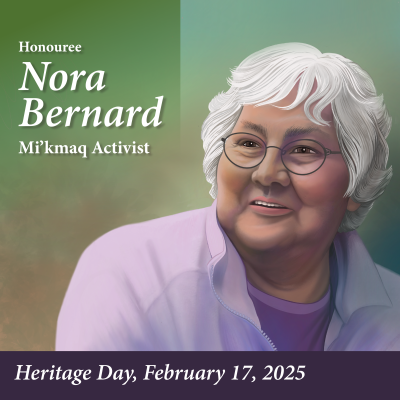Click here for Mi’kmaq translation
Celebrated the third Monday in February, Nova Scotia Heritage Day is an annual reminder of our storied past and an opportunity to honour the remarkable people, places and events that have contributed to this province’s unique heritage.
This year, we honour Mi’kmaw activist Nora Bernard.
Nora was born on September 22, 1935, at Millbrook First Nation, one of seven children. When Nora was nine years old, her mother was forced to send Nora and her siblings to the Shubenacadie Indian Residential School.
Nora went on to marry and had six children. She was a mother, grandmother, aunt, wife, and Elder in her community.
Her family and community were very important to her. In 1987, she founded the Shubenacadie Indian Residential School Association and began to search for and contact other Survivors. This was the start of her fight for justice, recognition and compensation for Survivors of the Canadian Indian Residential School system.
In 1995, she launched a class-action lawsuit against the Government of Canada. This was the catalyst that led to the largest class-action lawsuit in Canadian history and compensation for Survivors across the country.
Nora died in 2007 and sadly did not witness the formation of the Truth and Reconciliation Commission which continues today to raise awareness of the residential school system and its impacts. We remember and honour her as a brave champion for her community and Indigenous people across Canada.
Célébrée le troisième lundi de février, la Journée du patrimoine de la Nouvelle-Écosse est un rappel annuel de notre passé riche en histoire et une occasion de rendre hommage aux gens, aux lieux et aux événements remarquables qui ont contribué au patrimoine unique de cette province.
Cette année, nous rendons hommage à la militante mi'kmaw Nora Bernard.
Nora est née le 22 septembre 1935 dans la Première nation de Millbrook, et elle est une de sept enfants. Lorsque Nora avait 9 ans, sa mère a été forcée d'envoyer Nora et ses frères et sœurs au pensionnat Shubenacadie Indian Residential School.
Nora s'est mariée et a eu six enfants. Elle a été mère, grand-mère, tante, épouse et Aînée dans sa communauté.
Sa famille et sa communauté étaient très importantes pour elle. En 1987, elle a fondé l'association Shubenacadie Indian Residential School Association, et elle a entamé sa recherche pour d'autres survivants. C'était le début de sa lutte pour la justice, la reconnaissance et l'indemnisation des survivants du système canadien des pensionnats autochtones.
En 1995, elle a lancé un recours collectif contre le gouvernement du Canada. C'est ce qui a mené au plus important recours collectif de l'histoire du Canada et à l'indemnisation des survivants à l'échelle du pays.
Nora est décédée en 2007 et elle n'a malheureusement pas été témoin de la création de la Commission de vérité et de réconciliation, qui continue aujourd'hui à sensibiliser les gens au système des pensionnats et à ses répercussions. Nous lui rendons hommage à titre de brave championne de sa communauté et des peuples autochtones à l'échelle du Canada.

